
direct booking tools
12 Best Direct Booking Tools for STRs in 2025
Posted on Oct 19, 2025

For short-term rental managers, relying solely on Online Travel Agencies (OTAs) means sacrificing significant revenue and control. High commission fees, restrictive policies, and a lack of direct guest communication can severely limit your business's growth potential. The most effective way to reclaim your independence and boost profitability is by implementing a robust direct booking strategy, and the right software is the cornerstone of this approach.
This guide is designed to help you navigate the crowded market of direct booking tools. We have compiled a comprehensive list of the top platforms available, moving beyond generic marketing claims to provide a detailed analysis of what each tool actually delivers. For every option, we break down core features, potential limitations, and specific use-case scenarios to help you identify the best fit for your operational needs, whether you manage a single property or a large portfolio.
At the core of any direct booking strategy is the ability to easily facilitate online appointment booking. Each entry in our list includes screenshots and direct links to simplify your evaluation process. Our goal is to equip you with the insights necessary to select a tool that not only builds a beautiful, commission-free booking website but also integrates seamlessly with your existing property management workflow.
1. hostAI
Best For: Automating and scaling direct booking marketing with a comprehensive AI-powered suite.
hostAI stands out as a formidable, all-in-one solution for short-term rental managers aiming to reclaim their revenue from third-party platforms. It centralizes critical marketing functions into a single, AI-driven ecosystem, combining an intelligent website builder (hostFront), an automated email marketing engine (hostMail), and an AI-powered advertising campaign manager (hostDistro). This integrated approach ensures brand consistency and maximizes efficiency, making it one of the most powerful direct booking tools available.
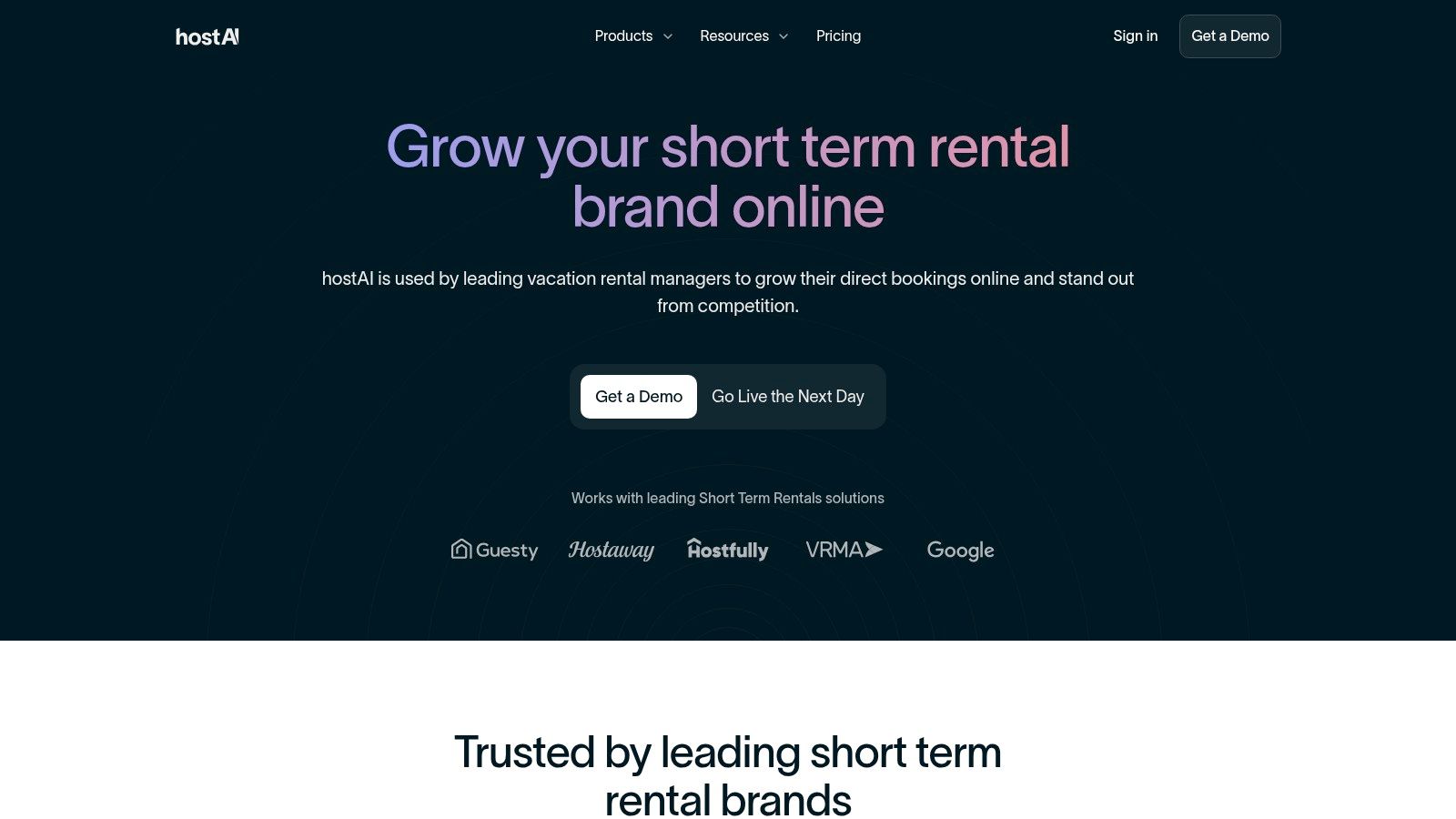
The platform’s strength lies in its ability to automate complex marketing tasks that typically require significant time and expertise. For instance, its programmatic SEO feature helps properties rank higher in search results organically, while smart retargeting campaigns re-engage potential guests who have previously shown interest. These advanced features, combined with personalized pricing strategies, create a high-converting guest journey from first touchpoint to final booking.
Key Features & Analysis
- Integrated Marketing Suite: The synergy between hostFront, hostMail, and hostDistro is the core advantage. Users can launch a high-performance website, nurture leads with automated emails, and run targeted ads without juggling multiple disconnected tools. This creates a seamless data flow, allowing the AI to optimize campaigns based on real-time performance.
- Programmatic SEO & Smart Retargeting: Unlike generic website builders, hostAI is built for visibility. It automates SEO best practices tailored to the travel industry and uses intelligent retargeting to bring back high-intent visitors, significantly boosting conversion rates and return on ad spend.
- Proven ROI: Customer testimonials and case studies report substantial results, including monthly direct booking revenue increases up to $35,000 and a 5x to 10x return on advertising spend.
Pros and Cons
| Pros | Cons |
|---|---|
| Comprehensive AI suite for websites, email, and ads. | Pricing is not publicly listed and requires a demo. |
| Reduces reliance on OTAs, cutting down on commission fees. | Best suited for managers ready to invest in a dedicated digital marketing strategy. |
| Demonstrated success with significant revenue growth for users. | May be overly comprehensive for single-property owners with minimal marketing needs. |
| Rapid deployment, allowing businesses to go live quickly. | |
| Advanced features like personalized pricing and programmatic SEO. |
Implementation & Use Case
A multi-property management company can use hostAI to unify its brand presence. The hostFront tool creates a professional, bookable website, while hostDistro launches AI-optimized ads on Google and social media. As traffic grows, hostMail automatically captures leads and sends personalized follow-up campaigns to past guests, encouraging repeat bookings and building a loyal customer base completely independent of OTAs.
Website: gethostai.com
2. Lodgify
Lodgify offers an all-in-one solution for property managers seeking to quickly launch a professional direct booking website. Its core strength lies in combining an easy-to-use website builder with a powerful, integrated property management system (PMS). This makes it one of the most efficient direct booking tools for operators who need a functional, brandable site without extensive technical work. The platform is designed for scalability, serving everyone from single-property owners to managers with large portfolios.
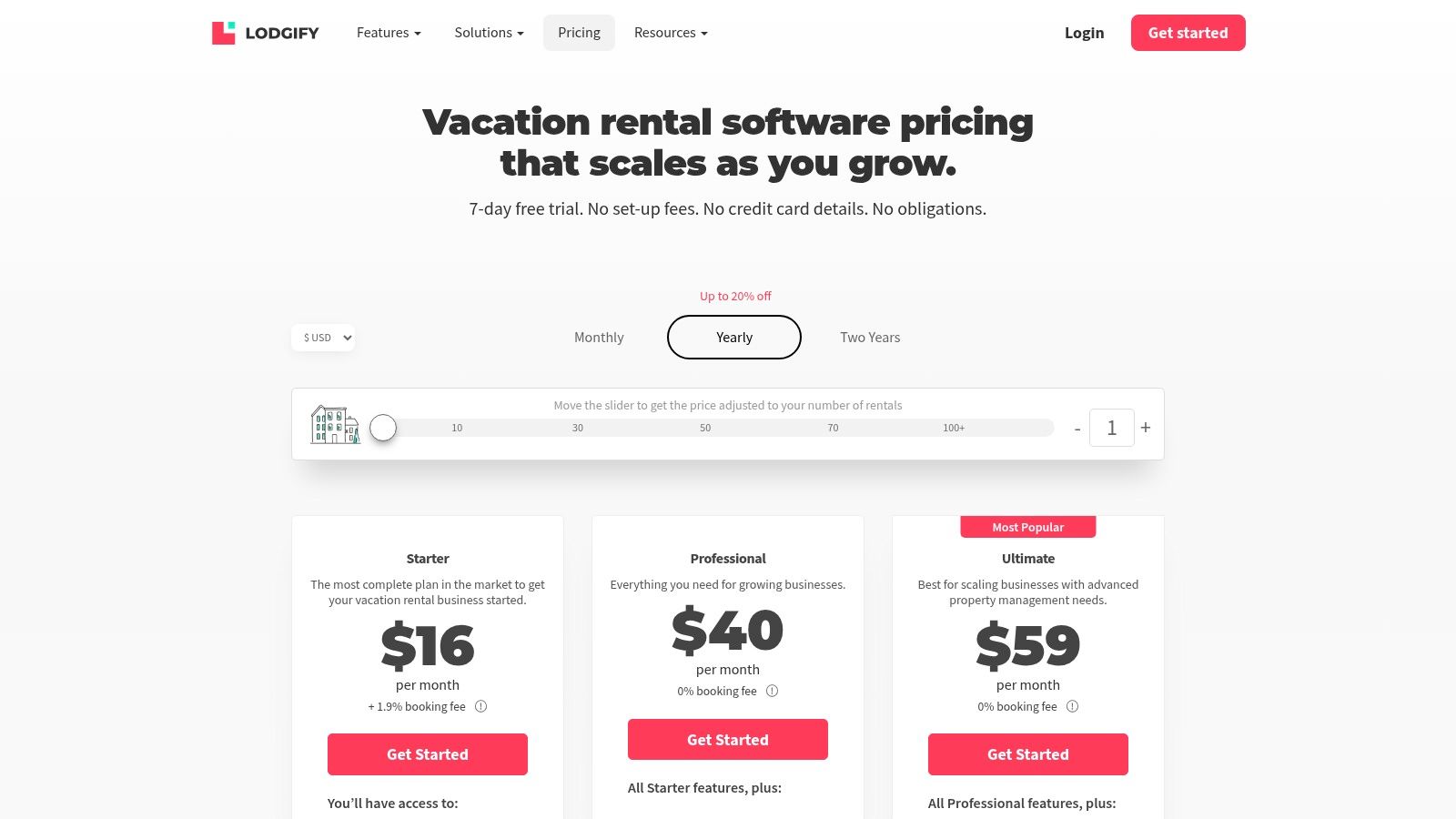
Key Features and Use Cases
Lodgify excels with its template-based website builder that includes a built-in booking engine, payment processing via Stripe or PayPal, and a robust channel manager. A key use case is for managers wanting to synchronize their direct site with OTAs like Airbnb and Vrbo from a single calendar, preventing double bookings. The unified inbox streamlines guest communication across all channels.
For those with an existing website (like one built on WordPress or Squarespace), Lodgify’s embeddable booking widget is a major advantage, allowing you to add direct booking functionality without a full site migration.
Pricing and Limitations
Lodgify's pricing starts with a "Starter" plan that includes a 1.9% booking fee. However, their popular "Professional" and "Ultimate" plans eliminate this fee, making them more cost-effective for businesses with steady booking volume. A potential downside is that some advanced features, such as deep analytics and Google Vacation Rentals integration, are reserved for higher-tier plans.
Website: https://www.lodgify.com/pricing/
3. Guesty
Guesty is an enterprise-grade property management platform that provides a comprehensive suite of solutions for professional hosts and large-scale operators. While known for its robust PMS capabilities, it also offers powerful direct booking tools designed for scalability. The platform’s core advantage is its ability to centralize complex operations, from multi-channel distribution and guest communication to accounting and owner reporting, making it ideal for managers aiming for significant growth.
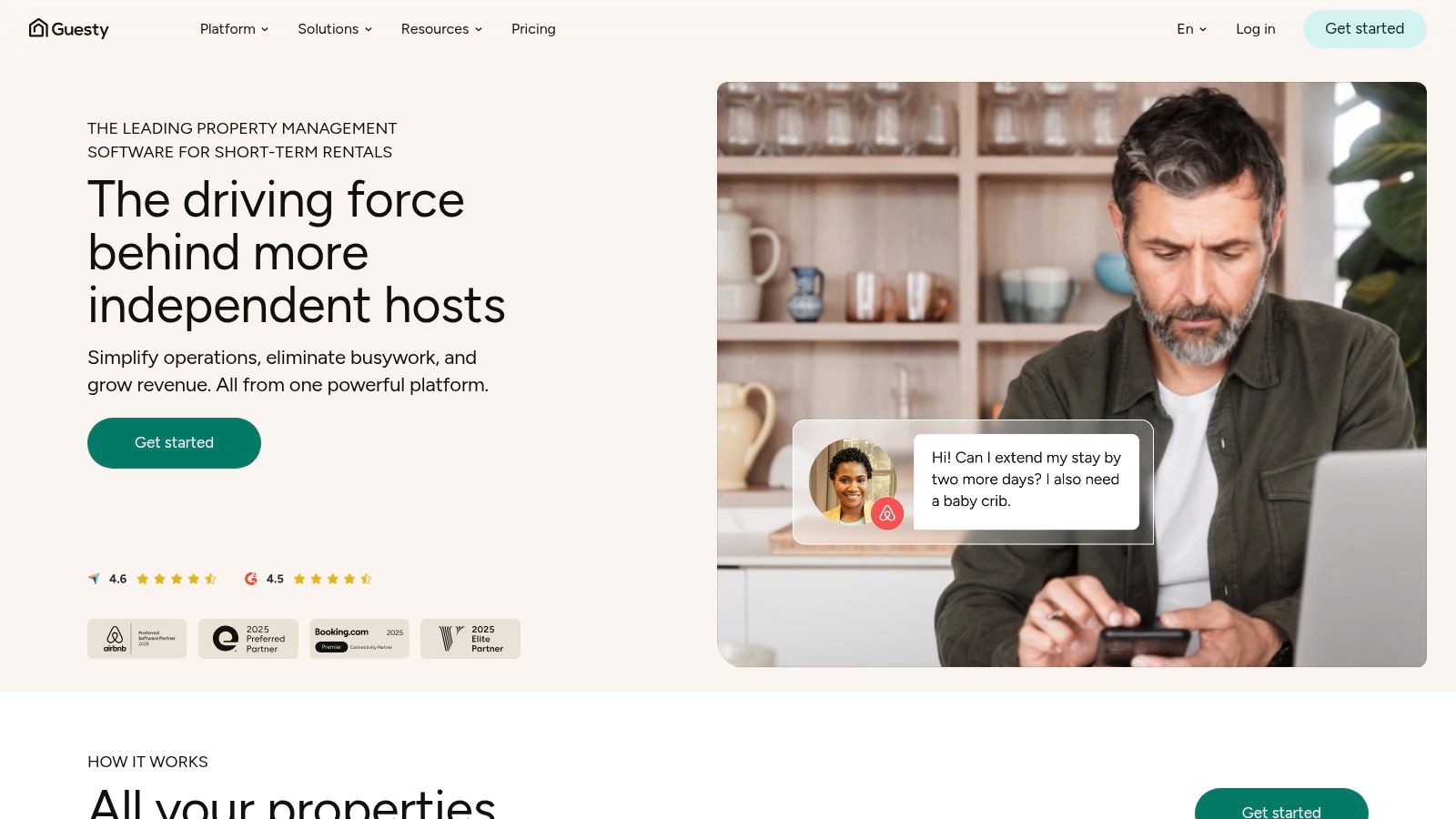
Key Features and Use Cases
Guesty's direct booking website builder is highly flexible, offering options from a free basic subdomain to fully customized, brandable sites on your own domain. A key use case is for established property managers who need a booking site that seamlessly integrates with their existing operational tools. The platform includes a unified inbox, a multi-calendar, and advanced automation for messages, reviews, and tasks.
For data-driven operators, Guesty’s integration with third-party revenue management tools and its native analytics provide deep insights into performance. This makes it a strong choice for businesses focused on maximizing revenue across their direct channel and OTAs simultaneously.
Pricing and Limitations
Guesty’s pricing is quote-based for its Pro and Enterprise plans, reflecting its focus on customized solutions for larger portfolios. The advanced website builder comes with a 0.5% fee on the gross booking value from direct bookings. A potential limitation is the learning curve; the platform's extensive feature set can be complex for new or smaller operators to fully leverage without dedicated training.
Website: https://www.guesty.com/
4. Hostaway
Hostaway is a comprehensive vacation rental platform where a direct booking website is a core component of its powerful property management system (PMS) and channel manager. It’s built for scaling, making it a go-to for established managers with growing portfolios who need a centralized hub to manage operations. The platform's strength lies in its deep integration, ensuring that your direct site, OTA listings, and backend tasks all work in unison, positioning it as one of the most robust direct booking tools for professional operators.
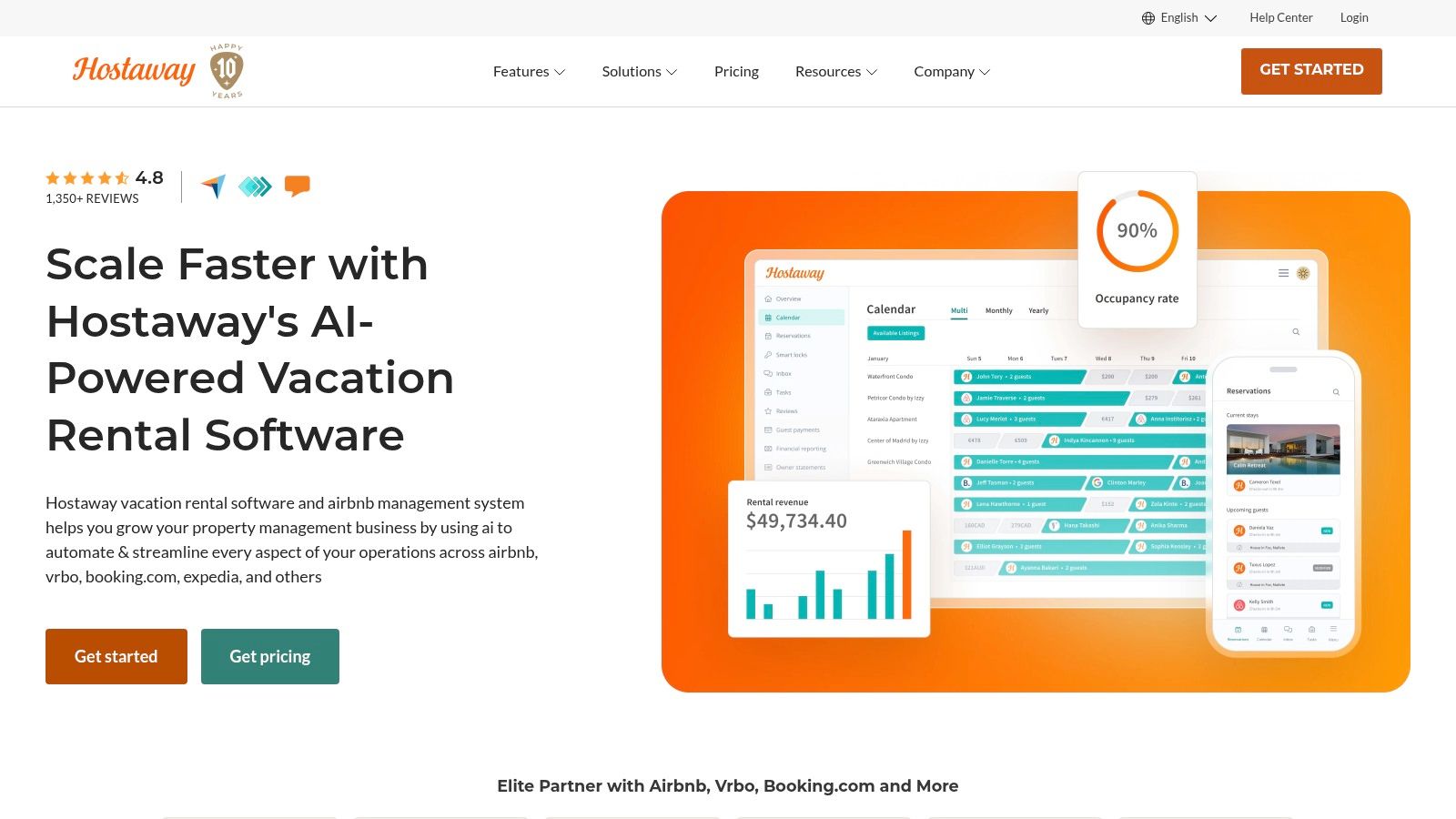
Key Features and Use Cases
Hostaway’s direct booking website comes standard, fully integrated with its other modules. A key use case is for managers aiming to automate guest communication and operational workflows; its advanced messaging tools and marketplace of integrations (like smart locks and dynamic pricing) allow for a highly streamlined guest experience. This makes it ideal for running a multi-property business efficiently.
As one of the best short-term rental software options available, its strong channel connectivity ensures rate and availability parity across your direct site and platforms like Airbnb, Vrbo, and Booking.com. The robust reporting and analytics also provide deep insights into booking trends and revenue performance.
Pricing and Limitations
Hostaway's pricing is available by quote only, tailored to the size and needs of a property manager's portfolio. While the direct booking site is included in the base platform, there is no free trial to test the system beforehand. A potential drawback is that some desired integrations and add-on services, such as advanced insurance or specific smart home devices, will incur extra costs on top of the base subscription fee.
Website: https://www.hostaway.com/
5. SiteMinder
SiteMinder is a hotel-centric commerce platform that offers powerful direct booking capabilities through its commission-free booking engine, "TheBookingButton." While traditionally focused on hotels, its robust feature set makes it one of the most comprehensive direct booking tools for larger short-term rental operators and property management groups. The platform excels at creating a seamless, brand-controlled guest acquisition funnel, from a custom website to secure payment processing. Its strength lies in its extensive ecosystem and multi-property management features.
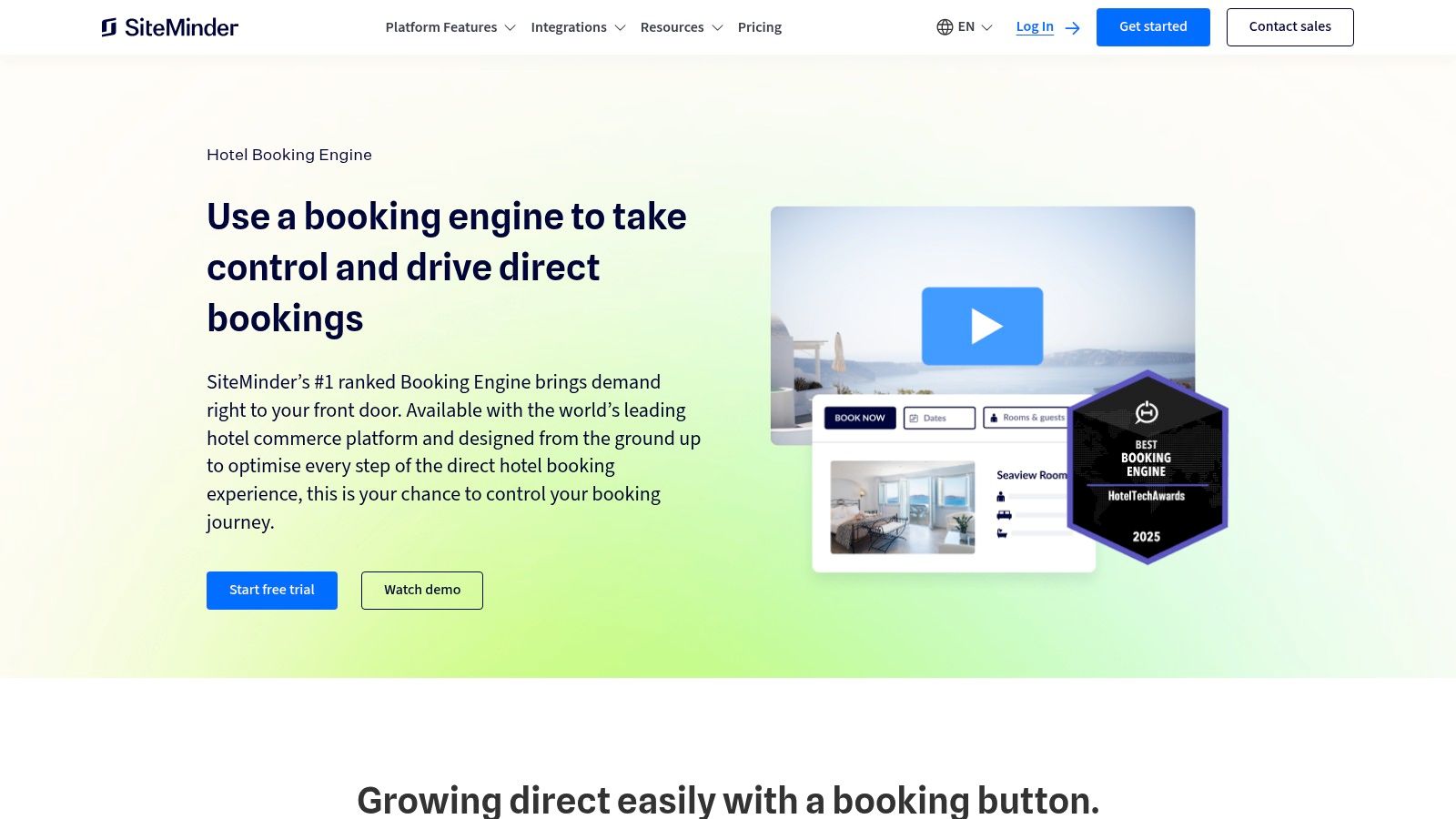
Key Features and Use Cases
SiteMinder's core offering includes a website builder, a powerful channel manager, and its award-winning booking engine. A key use case is for property groups managing multiple brands or locations who need a centralized system with multi-language and multi-currency support. The Direct Booking API is a significant advantage for chains wanting to integrate a customized booking experience across their entire portfolio. This approach is a core element in building a strong direct distribution strategy, which is critical for scaling a rental business.
Pricing and Limitations
SiteMinder's pricing is primarily quote-based, tailored to the specific modules and scale of your business. The platform delivers its best value when multiple components, like the website builder, channel manager, and booking engine, are bundled together. A potential limitation for smaller operators is that the system is more geared towards hotel-style operations and may feel overly complex for single-property owners. The lack of transparent, tiered pricing can also be a hurdle for those in the initial research phase.
Website: https://www.siteminder.com/the-booking-button/
6. Cloudbeds
Cloudbeds provides an end-to-end hospitality management platform geared toward hotels, hostels, and larger property groups. Its primary advantage is a mature, commission-free booking engine that is deeply integrated with its powerful property management system (PMS). This makes it one of the most robust direct booking tools for operators who need advanced features like group booking management and sophisticated payment controls, all managed from a central hub.
Key Features and Use Cases
Cloudbeds shines with its highly customizable direct booking engine, which includes website widgets and extensive branding options to match any property's aesthetic. A standout feature is its Group Booking Engine, allowing organizers to reserve blocks of rooms, making it ideal for managing events or corporate stays. Secure payment processing is handled through Cloudbeds Payments, which offers built-in fraud controls.
A key use case is for multi-property organizations needing a unified system to manage direct reservations across their portfolio. The platform’s API also allows for custom integrations, offering flexibility that many template-based builders lack. Cloudbeds is a powerful option for those looking to implement direct booking strategies across a diverse range of properties.
Pricing and Limitations
Cloudbeds operates on a quote-based pricing model, so you must contact their sales team for specific details. Pricing is typically tiered based on the number of properties and the features required. A common limitation is that some of the most impactful features, like advanced reporting and the full suite of integrations, are reserved for higher-tier plans, which can increase the overall cost for smaller operators.
Website: https://www.cloudbeds.com/
7. Little Hotelier
Little Hotelier is a dedicated solution from SiteMinder built specifically for small properties like B&Bs, inns, and guesthouses. It combines essential front desk and property management tools with a direct booking engine and channel manager, making it a powerful all-in-one platform for smaller operators. Its core advantage is simplifying complex operations for teams that don't have extensive technical resources, positioning it as one of the most accessible direct booking tools for the boutique accommodation sector.
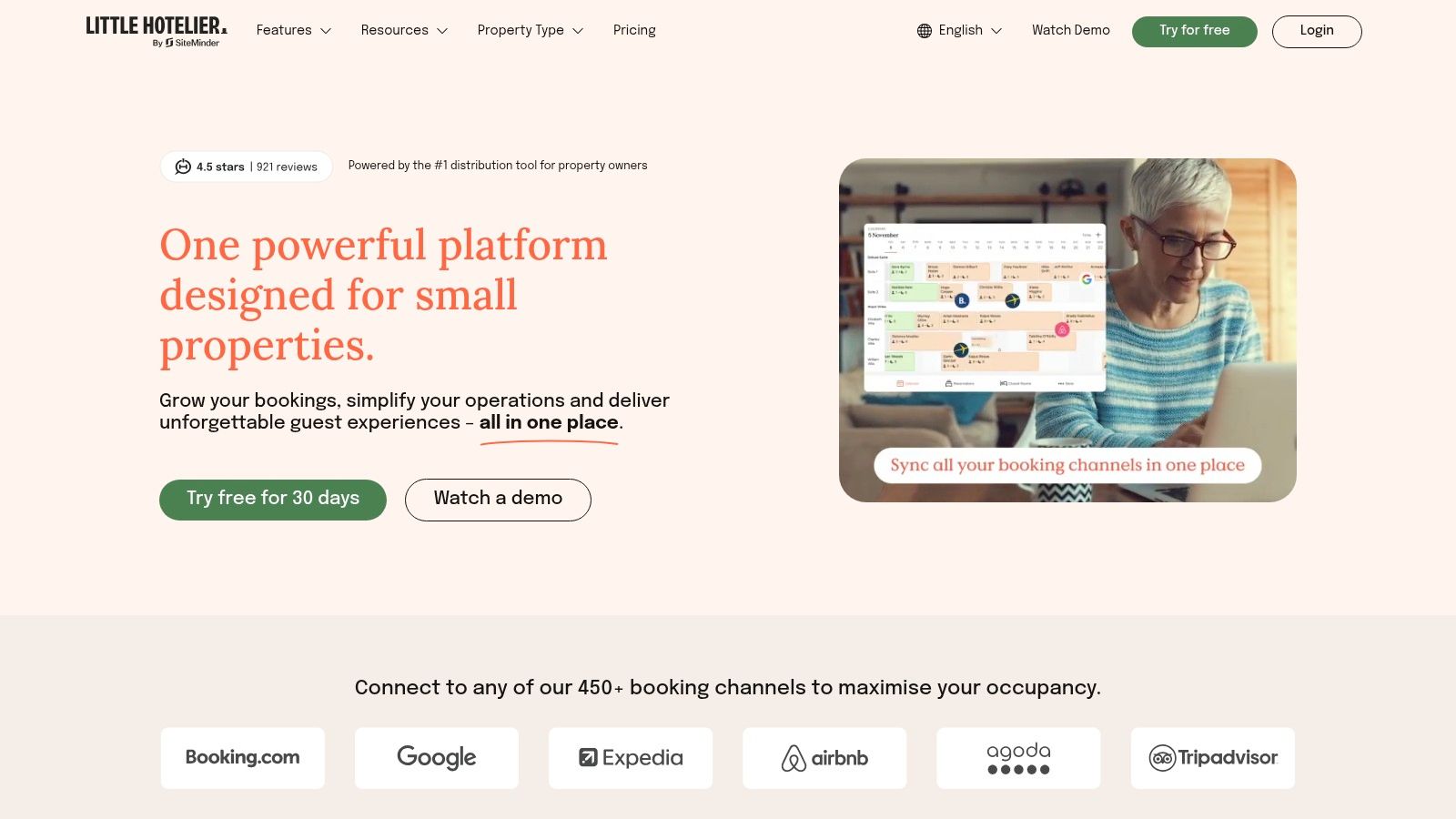
Key Features and Use Cases
Little Hotelier streamlines daily tasks with an integrated front desk system for managing check-ins, check-outs, and housekeeping reports from a single dashboard. A primary use case is for owners of small inns who need to sync rates and availability across a handful of key OTAs while driving commission-free direct bookings through their website. The platform includes a simple, mobile-friendly website builder and a booking engine designed for quick deployment.
The mobile app and 24/7 support are significant benefits for hands-on managers who need to handle operations on the go. Its channel manager scales from 5 to over 400 connections, depending on the chosen plan.
Pricing and Limitations
Pricing is structured in tiers, starting with a basic plan that includes a 1% fee on booking value. Higher-tier plans eliminate this fee and unlock more advanced features, such as expanded OTA connections, metasearch integration, and premium phone support. A key limitation is that its feature set, while perfect for small properties, may lack the deep customization and robust reporting that larger or multi-property management companies require.
Website: https://www.littlehotelier.com/
8. Bookeo
Bookeo is a versatile and highly specialized booking platform that extends beyond accommodations, making it ideal for businesses that offer tours, classes, or specific appointment-based services alongside their rentals. Its strength lies in its ability to manage complex scheduling and capacity, offering embeddable widgets that integrate directly into any existing website. While not a full property management system, it serves as one of the most flexible direct booking tools for operators who need to manage activities and services, not just stays.
Key Features and Use Cases
Bookeo’s core offering is its powerful website booking widget, which supports everything from calendar management to coupons and gift vouchers. A key use case is for property managers who also run local experiences like cooking classes or guided tours and want a single, embeddable system to handle all bookings. It integrates with major payment gateways and offers business-specific plans for Appointments, Classes, or Tours.
For businesses with multiple locations or staff members, its multi-user and multi-location support allows for centralized management of schedules and availability, making it highly scalable for growing service-oriented hospitality businesses.
Pricing and Limitations
Bookeo offers transparent, commission-free monthly pricing based on the number of bookings and features, with a generous 30-day free trial. Plans like "Standard" and "Large" are affordable for small to medium-sized businesses. A potential limitation is its design customization; the widgets are functional but may not match the branding of a fully custom website. Furthermore, its built-in CRM and marketing features are more basic compared to all-in-one vacation rental software.
Website: https://www.bookeo.com/
9. FareHarbor
While primarily known as a booking platform for tours and activities, FareHarbor offers powerful features that make it a compelling option for experience-focused rental operators. Its strength lies in providing a seamless, mobile-optimized checkout process designed for high conversion rates. For property managers who bundle accommodations with unique experiences like guided tours or classes, FareHarbor is one of the most effective direct booking tools for managing both aspects in a unified system. The platform offers extensive onboarding and 24/7 support, which is a significant advantage for those new to direct booking software.
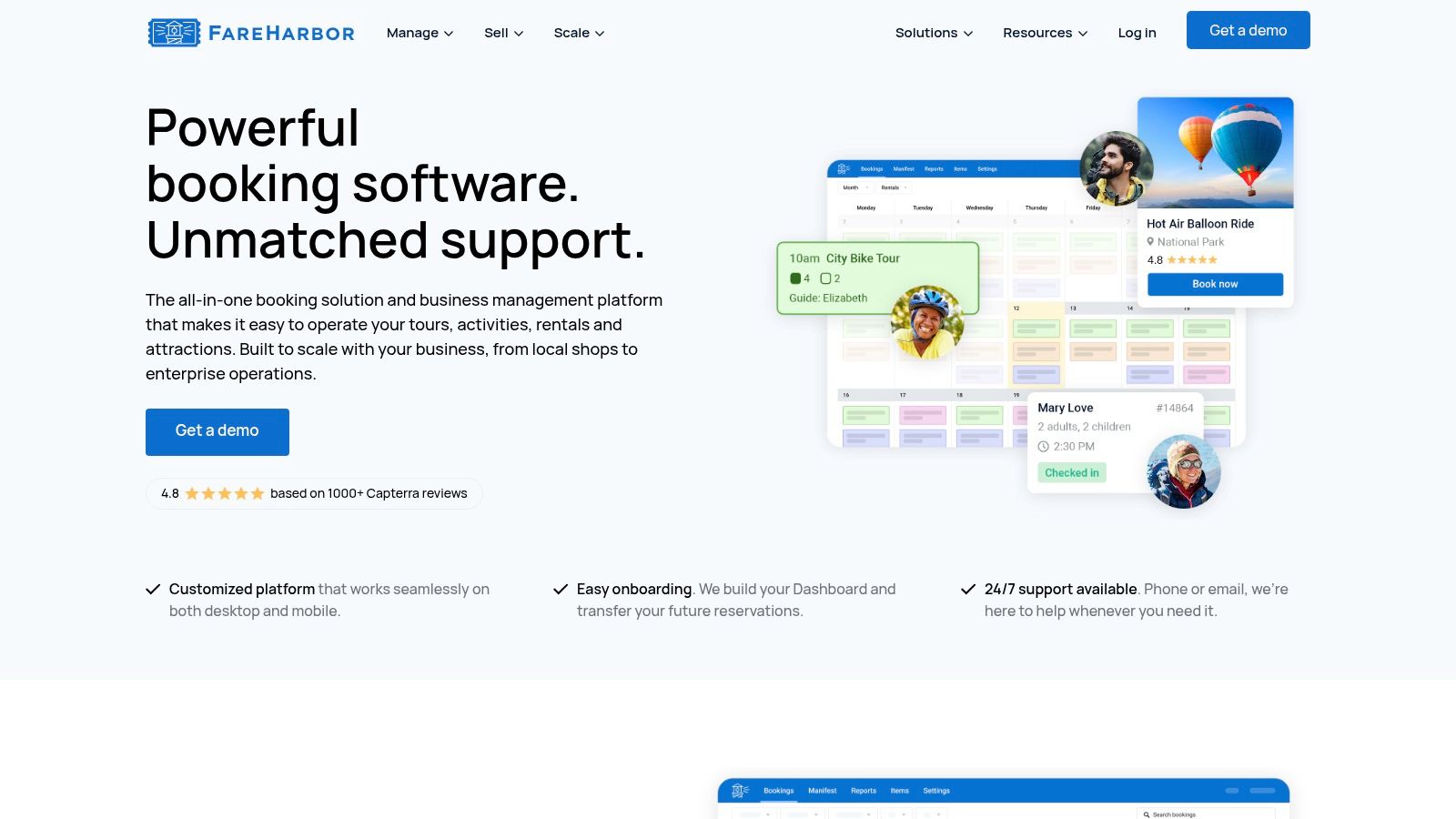
Key Features and Use Cases
FareHarbor's core feature is its embeddable booking widget, which can be easily added to any existing website to handle real-time availability and secure payments. A primary use case is for operators of agritourism stays, retreats, or glamping sites who sell experiences alongside lodging. The system centralizes all bookings into a single dashboard, simplifying management.
Its robust support and onboarding process are particularly useful for businesses that need hands-on assistance setting up their booking flow. The platform also provides access to a large distribution network, allowing operators to sell their offerings through various partners.
Pricing and Limitations
FareHarbor’s pricing is not publicly listed and is based on a booking fee model that can vary. While there are no monthly subscription fees for the core software, this percentage-based cost can become significant at high volumes. Another limitation is that its optional managed website service, while professional, comes at a high subscription cost (around $5,000 per year), making it less accessible for smaller operators.
Website: https://fareharbor.com/
10. Checkfront
Checkfront is a cloud booking platform built for tours, activities, and rentals, offering robust features that translate well for unique or experience-driven short-term stays. Its strength lies in flexible resource and availability management, making it an excellent choice for properties that offer more than just accommodation, such as equipment rentals or on-site activities. For operators who want to bundle services, Checkfront is one of the more versatile direct booking tools available.
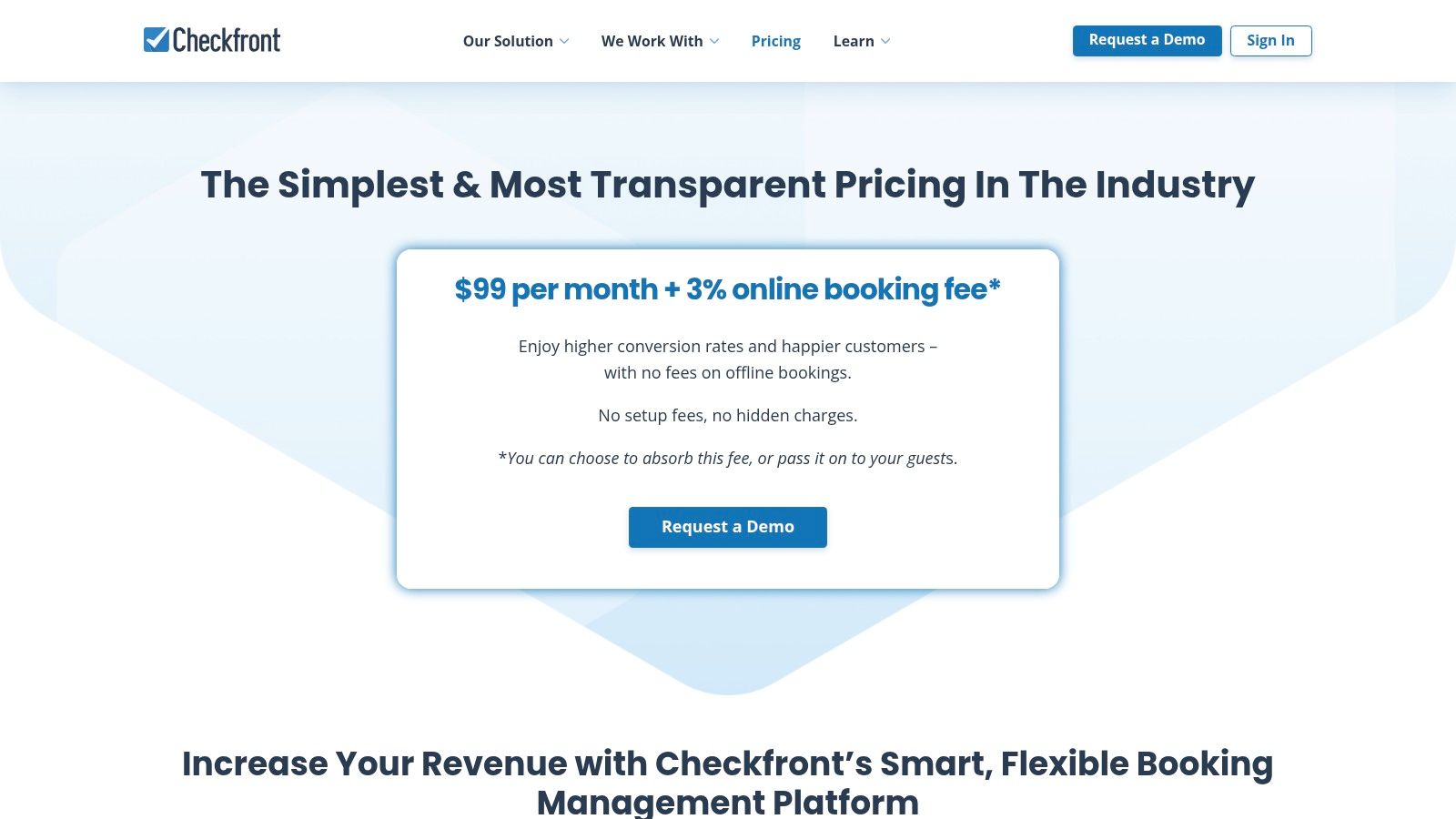
Key Features and Use Cases
Checkfront provides modern, fast, and conversion-optimized booking widgets that can be embedded into any website. A primary use case is for managers needing to handle complex scheduling like hourly, daily, or multi-day bookings from a single system. The platform integrates with major OTAs for tours and activities, such as Viator and Google Things to do, allowing property managers to diversify their revenue streams beyond just nightly stays. Full API access without extra fees also allows for deep custom integrations.
Pricing and Limitations
Checkfront's pricing is straightforward: a single plan at $99 per month plus a 3% online booking fee. A significant advantage is that there are no fees on offline (phone, in-person) bookings or on reservations coming through their API or OTA channels. However, the 3% online booking fee may be a considerable drawback for low-margin operators or those with very high direct booking volume, where a flat-fee model would be more cost-effective.
Website: https://www.checkfront.com/plans/
11. Rezdy
While many tools on this list cater to accommodation, Rezdy is an industry leader specifically designed for tours, activities, and experience providers. It provides a robust online booking engine that empowers operators to sell directly from their own websites, cutting down on commission fees. Rezdy stands out as one of the most effective direct booking tools for the "things to do" sector, offering not just a booking widget but a complete business management platform with a vast distribution network.
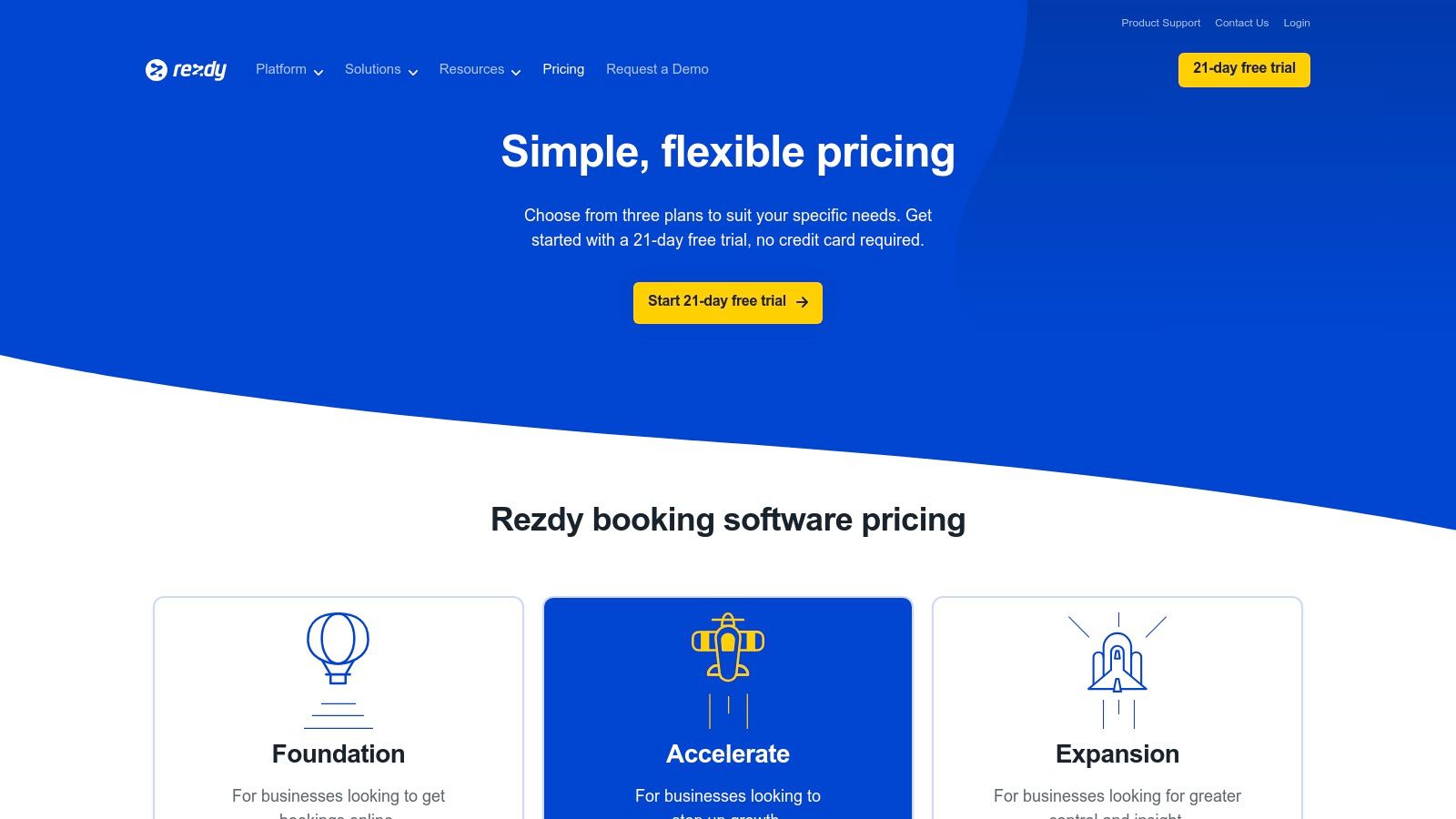
Key Features and Use Cases
Rezdy’s core feature is its easily embeddable booking engine and "Book Now" button, complete with mobile-optimized checkout. It supports complex product offerings, including gift cards, packages, and promotional codes. A primary use case is for tour operators wanting to expand their reach beyond direct sales. The built-in channel manager connects to a massive marketplace of resellers and OTAs, allowing businesses to manage all their distribution from one centralized dashboard.
Higher-tier plans also offer an API and webhooks, enabling custom integrations for larger operators who need to connect Rezdy with other business systems.
Pricing and Limitations
Rezdy offers transparent, tiered monthly pricing with a 21-day free trial. Plans like "Foundation," "Accelerate," and "Expansion" provide progressively advanced features. A key advantage is its large agent marketplace, which can significantly boost distribution. However, a notable limitation is the 3% fee on all online bookings that applies across every plan. Lower-tier plans also incur per-booking fees for offline bookings, making them less ideal for businesses with high volumes of in-person sales.
Website: https://rezdy.com/pricing/
12. WooCommerce Bookings
For property managers with a WordPress website, WooCommerce Bookings offers a powerful and flexible way to integrate booking functionality directly. As an official plugin, it transforms a standard e-commerce setup into a fully operational system for selling time-based inventory like rentals and appointments. Its main advantage is giving you complete ownership over your data and branding, making it one of the most customizable direct booking tools for those who prefer the WordPress ecosystem.
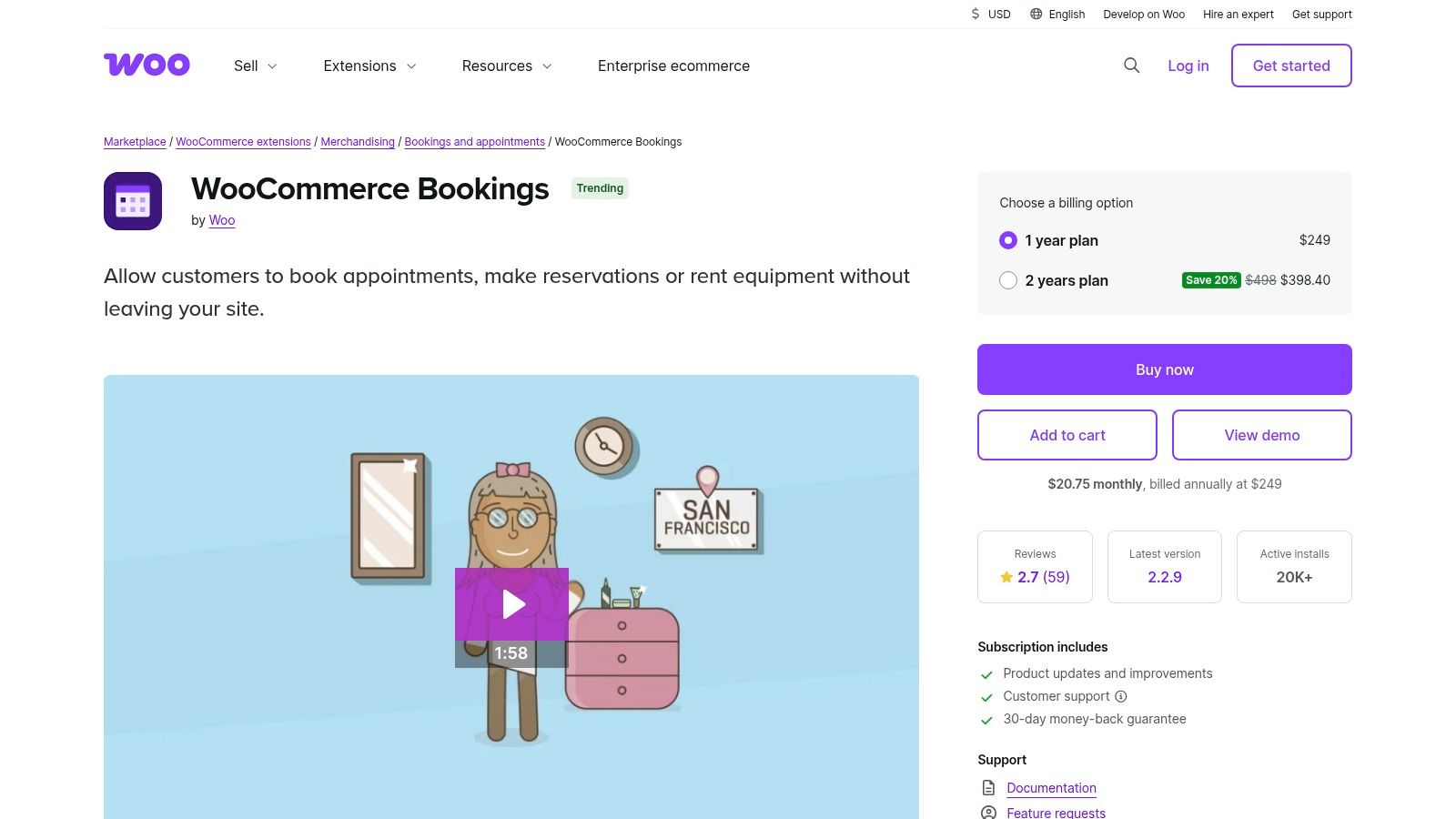
Key Features and Use Cases
WooCommerce Bookings allows you to define bookable "products" with flexible pricing and availability rules, such as per-person rates, fixed time slots, and seasonal pricing adjustments. A key use case is for managers wanting to sell add-on services like equipment rentals or tours alongside their property bookings. Since it leverages the entire WooCommerce ecosystem, it integrates seamlessly with major payment gateways like Stripe and PayPal, along with countless other extensions for marketing and analytics.
Pricing and Limitations
The plugin is sold as a one-time annual license, which eliminates per-booking platform fees common with other SaaS solutions. This can be highly cost-effective for properties with high booking volumes. However, the primary limitation is its dependency on a self-managed WordPress site, which requires separate hosting and technical maintenance. The initial setup and configuration can have a significant learning curve compared to all-in-one platforms, and its full potential often relies on combining it with other add-on plugins.
Website: https://woocommerce.com/products/woocommerce-bookings/
Direct Booking Tools Feature Comparison
| Platform | Core Features | User Experience / Quality | Value Proposition | Target Audience | Price Points / Notes |
|---|---|---|---|---|---|
| hostAI | AI-driven email marketing, websites, ad campaigns; programmatic SEO, personalized pricing | Modern, user-friendly, rapid deployment | Boosts direct bookings, cuts costly fees | STR managers, vacation rental brands | Pricing on inquiry; high ROI, doubles revenue |
| Lodgify | Direct-booking website, channel manager, payments integration | Fast launch, good onboarding | Scales from solo hosts to managers | Hosts & property managers | Starter 1.9% fee; Pro plans 0% booking fee |
| Guesty | PMS with website builder, automation, accounting, OTA distribution | Enterprise-grade, flexible websites | Scalable, broad connectivity | Small to enterprise STR managers | Quote-based pricing; advanced websites add fees |
| Hostaway | PMS, channel manager, direct-booking sites, messaging, analytics | Scales well, strong automation | Good for growing portfolios | Multi-property managers | Quote-only pricing; add-ons extra |
| SiteMinder | Commission-free booking engine, website builder, channel manager | Award-winning, strong ecosystem | Best for groups and chains | Hotels, multi-property groups | Quote-based; best value with multiple modules |
| Cloudbeds | PMS with commission-free booking engine, group booking API | Mature engine, highly configurable | Supports multi-property and groups | Hotels, hostels, boutique stays | Pricing on request; some features on higher tiers |
| Little Hotelier | Booking engine, front desk, channel manager, reporting | Quick deployment, mobile app | Designed for small hotels and B&Bs | Small hotels, inns, motels | Some plans 1% booking fee; advanced support on tiers |
| Bookeo | Booking widgets for appointments, classes, tours, multi-location | Easy SMB setup, 30-day trial | Transparent pricing, scalable | Small and medium businesses | Public pricing; basic marketing features |
| FareHarbor | Booking widgets, managed websites, integrated payments | Strong US presence, 24/7 support | High mobile conversions | Tours, activities, attractions | Variable fees; managed website costly (~$5,000/yr) |
| Checkfront | Booking widgets, resource mgmt, OTA integrations, API access | Fast, modern widgets, transparent pricing | Simple pricing; no OTA/API booking fees | Tours, rentals, activities | $99/mo + 3% online fee; single pricing plan |
| Rezdy | Booking engine, agent marketplace, promos, API/webhooks | Transparent tiers, 21-day free trial | Large agent marketplace | Experience providers | 3% online booking fee; offline fees on lower tiers |
| WooCommerce Bookings | WordPress booking plugin with flexible pricing and integrations | Full site control, high customization | No per-booking fees; plugin ecosystem | WordPress site owners | Annual license; requires WP hosting/manage |
Making Your Final Decision: It's About Strategy, Not Just Software
Navigating the landscape of direct booking tools can feel overwhelming, but as we've explored, the goal isn't just to pick software; it's to implement a robust direct booking strategy. From all-in-one property management systems like Guesty and Hostaway to dedicated website builders like Lodgify and even niche solutions like FareHarbor for experience-based stays, the right tool is the one that aligns with your specific business goals, operational scale, and guest experience philosophy.
The key takeaway is that there is no single "best" platform for everyone. A property manager with 100+ urban condos has vastly different needs than a boutique hotelier using Cloudbeds or an owner of a few unique glamping sites. Your decision hinges on a clear-eyed assessment of your own business.
Key Takeaways and Strategic Considerations
Before you commit, reflect on the core themes from our analysis. The most effective direct booking tools are more than just a calendar and a payment gateway. They are command centers for your brand, marketing, and guest communications.
Consider these critical factors:
- Scalability and Growth: Will your chosen tool grow with you? A platform like SiteMinder excels at channel management for larger portfolios, while a simpler solution might be perfect now but restrictive in two years.
- Integration Ecosystem: Your direct booking site doesn't operate in a vacuum. Assess how a tool integrates with your existing PMS, channel manager, dynamic pricing software, and smart home technology. Seamless integration saves countless hours of manual work.
- Total Cost of Ownership: Look beyond the monthly subscription fee. Factor in payment processing fees, add-on costs for essential features, and the potential revenue lost from a poor user experience or website downtime.
- Guest Experience: How does the tool empower you to create a memorable booking journey? Features like guest portals, automated messaging, and the ability to upsell services directly contribute to guest satisfaction and repeat bookings.
Your Actionable Next Steps
Feeling ready to move forward? Don't just pick a name from the list. Follow this structured approach to ensure you make an informed choice that will pay dividends for years to come.
- Define Your Non-Negotiables: Create a checklist of must-have features. Is it a multi-language website? A robust API? A specific payment gateway integration?
- Request Live Demos: Schedule demonstrations with your top 2-3 contenders. Prepare specific questions based on your unique operational challenges and pain points.
- Check Real-World Reviews: Go beyond testimonials. Look for discussions in industry forums or Facebook groups to see what real users are saying about reliability, customer support, and recent updates.
- Start a Trial: Whenever possible, use a free trial to test the user interface, set up a dummy property, and experience the workflow firsthand. This is the single best way to know if a platform is a good fit.
Ultimately, investing in the right direct booking tool is an investment in your brand's independence, profitability, and long-term resilience. It's about taking control of your business, owning your guest relationships, and building a sustainable future free from total reliance on third-party channels.
Ready to elevate your guest communication and operational efficiency? hostAI integrates seamlessly with your direct booking strategy by providing a 24/7 AI-powered guest assistant, freeing up your time to focus on growth while ensuring every guest inquiry receives an instant, accurate response. Explore how hostAI can become the ultimate support system for your new direct booking channel.